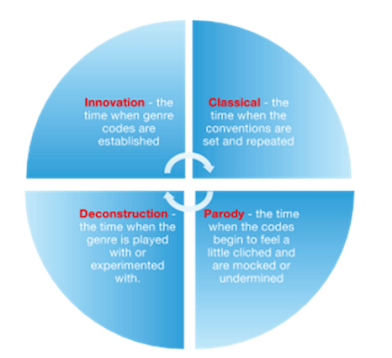Henry Jenkins - fandom blog tasks
Factsheet #107 - Fandom
Read Media Factsheet #107 on Fandom. Use our Media Factsheet archive on the M: drive Media Shared (M:\Resources\A Level\Media Factsheets) or log into your Greenford Google account to access the link. Read the whole of Factsheet and answer the following questions:
1) What is the definition of a fan?
A person with an extreme and uncritical enthusiasm or zeal - shortened to fan.
2) What the different types of fan identified in the factsheet?
2) What the different types of fan identified in the factsheet?
Hardcore, anti-fan and newbie
3) What makes a ‘fandom’?
3) What makes a ‘fandom’?
Fandoms are subcultures within which fans experience and share a sense of camaraderie with each other and engage in particular practices of their given fandom.
It confers a symbolic power and status for the fan, especially within the realm of their fandom.
5) What examples of fandom are provided on pages 2 and 3 of the factsheet?
5) What examples of fandom are provided on pages 2 and 3 of the factsheet?
- Rituals and Participation
- Ironic Readings
- Defy Critics and Institutions
- Imaginative Extension and Text Creation
It distinguishes fans from regular customers. They engage in diverse activities such as the production of websites, mods and hacks, private servers, game guides, walkthroughs and FAQs, fan fiction and forms of fan art, fan vids’ all of which have been aided by digital technology.
Henry Jenkins - degree-level reading
Read the final chapter of ‘Fandom’ – written by Henry Jenkins (note: link may be blocked in school - try this Google Drive link if you need it.) This will give you an excellent introduction to the level of reading required for seminars and essays at university as well as degree-level insight into our current work on fandom and participatory culture. Answer the following questions:
1) There is an important quote on the first page: “It’s not an audience, it’s a community”. What does this mean?
Average consumers are far more engaged with the flow of media are more active in shaping the flow of media through culture.
2) Jenkins quotes Clay Shirky in the second page of the chapter. Pick out a single sentence of the extended quote that you think is particularly relevant to our work on participatory culture and the ‘end of audience’ (clue – look towards the end!)
Some call such people “loyals,” stressing
the value of consumer commitment in an era of channel zapping; some are
calling them “media-actives,” suggesting that they are much more likely to
demand the right to participate within the media franchise than previous
generations; some are calling them “prosumers,” suggesting that as consumers produce and circulate media, they are blurring the line between
amateur and professional; some are calling them “inspirational consumers”
or “connectors” or “influencers,” suggesting that some people play a more
active role than others in shaping media flows and creating new values.
3) What are the different names Jenkins discusses for these active consumers that are replacing the traditional audience?
“loyals,” “media-actives,” “prosumers,” “connectors” or “influencers,”
4) On the third page of the chapter, what does Wired editor Chris Anderson suggest regarding the economic argument in favour of fan communities?
"Anderson argues that investing in niche properties with small but committed consumer bases may
make economic sense if you can lower costs of production and replace
marketing costs by building a much stronger network with your desired
consumers"
5) What examples does Jenkins provide to argue that fan culture has gone mainstream?
"EveryAfterword: The Future of Fandom 359
thing Bad Is Good for You"
6) Look at the quote from Andrew Blau in which he discusses the importance of grassroots creativity. Pick out a sentence from the longer quote and decide whether you agree that audiences will ‘reshape the media landscape from the bottom up’.
"This bottom up
energy will generate enormous creativity, but it will also tear apart some of
the categories that organize the lives and work of media makers" I agree with the statment. Media is very young and prone to changes and evolutions as time and technology moves on.
7) What does Jenkins suggest the new ideal consumer is?
A fan.
8) Why is fandom 'the future'?
Because the fandom is going to be the testing ground for the way media and culture industries are going to operate in the future.
9) What does it mean when Jenkins says we shouldn’t celebrate ‘a process that commodifies fan cultural production’?
It means that fan made things are being exploited without praising the original creator.
10) Read through to the end of the chapter. What do you think the future of fandom is? Are we all fans now? Is fandom mainstream or are real fan communities still an example of a niche media audience?
Everybody is a fan of something. They might not be a massive fan like swifties are but a fan to a certain degree they are. Fandom is the future of modern enjoyment as it allows people with similar interest to talk about their interest and express them self's. Slowly but surely fandom has became mainstream as it isn't seen as weird or cringe as it used to be.

Comments
Post a Comment